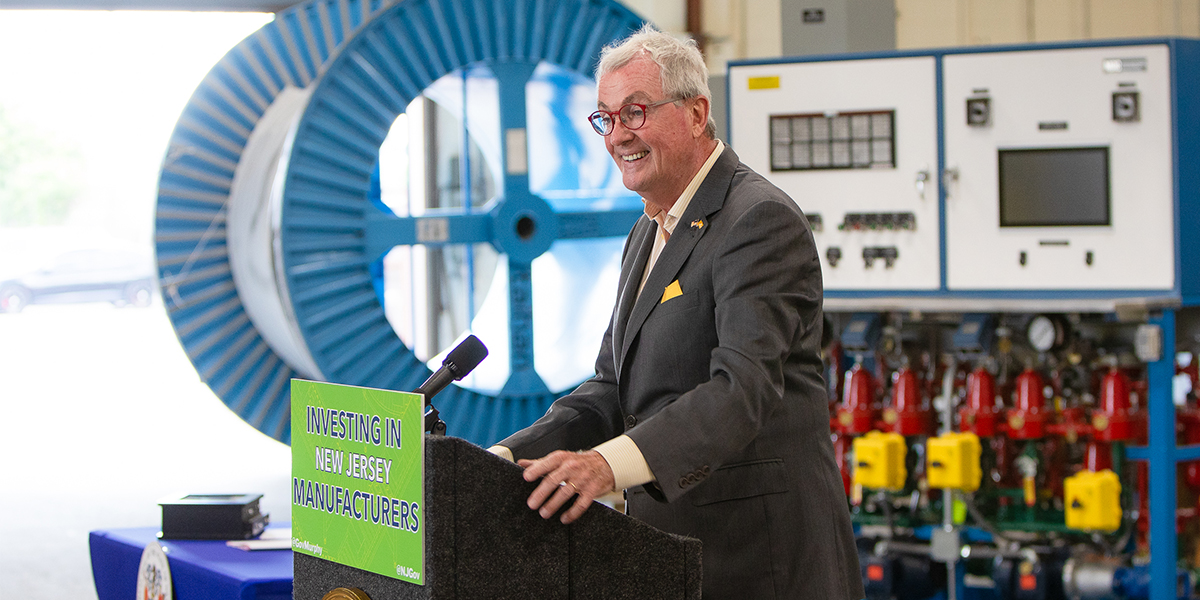New Jersey is making one of its largest manufacturing investments in decades — and it’s designed to strengthen the state’s economy, create high-paying jobs, and position the Garden State as a national leader in advanced industries.
On August 13, Governor Phil Murphy signed into law the bipartisan Next New Jersey Manufacturing Program, a $500 million initiative that will be administered by the New Jersey Economic Development Authority (NJEDA). The program is set to target a broad range of sectors — including advanced manufacturing, clean energy, defense, life sciences, and non-retail food and beverage production — industries that have historically been economic drivers in New Jersey.
The signing took place at MAC Products Inc. in Kearny, a long-standing New Jersey manufacturer known for producing electrical and mechanical systems. Murphy was joined by lawmakers from both parties, state officials, and business leaders who hailed the program as a historic step forward for the state’s economy.
A Bipartisan Push for New Jersey’s Future
The Next New Jersey Manufacturing Program was approved as part of the state’s Fiscal Year 2026 budget (via Assembly Bill 5687 / Senate Bill 4407). While Trenton politics often sees partisan gridlock, the bill’s support from both Democrats and Republicans underscores the shared recognition that manufacturing is essential to the state’s economic resilience.
“Since taking office, my administration has advanced policies that create good-paying jobs, attract cutting-edge manufacturers, and expand opportunity in communities across the state,” Murphy said during the signing ceremony. “The Next New Jersey Manufacturing Program builds on that progress, providing the support needed to accelerate growth, enhance our competitive position, and deliver lasting economic benefits for New Jersey manufacturers.”
Sen. Michael Testa (R-1st District), co-chair of the Manufacturing Caucus, called the bill “a historic investment” that reaffirms the state’s commitment to revitalizing its industrial backbone. Fellow co-chair Sen. Linda Greenstein (D-14th District) pointed to its role in boosting clean energy manufacturing, noting that the incentives will help create “high-quality jobs” while strengthening New Jersey’s reputation as an innovation hub.
What the Program Offers Manufacturers
Under the program, the NJEDA will provide targeted tax incentives and financial assistance to eligible businesses. Unlike past initiatives, this effort is highly focused on the industries that are expected to shape the next generation of economic growth — from clean energy manufacturing to advanced life sciences.
Key industries eligible for support include:
- Advanced Manufacturing – High-tech production facilities utilizing automation, robotics, and cutting-edge engineering.
- Clean Energy – Manufacturers producing components for wind, solar, and other renewable energy systems.
- Life Sciences – Biotechnology, pharmaceuticals, and medical device production.
- Defense Manufacturing – Contractors supplying the U.S. military and defense infrastructure.
- Non-Retail Food & Beverage – Large-scale producers supplying grocery, hospitality, and export markets.
The program is designed to lower operational costs for manufacturers, making it more attractive to either expand existing facilities or relocate operations to New Jersey.
Why This Matters for the Garden State Economy
Manufacturing has deep roots in New Jersey’s history, from shipbuilding and pharmaceuticals to electronics and textiles. While the sector has evolved over the years, its importance has not diminished — especially in a post-pandemic economy where domestic production and supply chain security are top priorities.
According to business leaders, the Next New Jersey Manufacturing Program addresses several key challenges:
- Job Creation – By incentivizing expansion, the program is expected to generate thousands of high-paying manufacturing jobs.
- Supply Chain Resilience – Encouraging local production reduces dependence on out-of-state and international suppliers.
- Sustainability – Emphasis on clean energy aligns with New Jersey’s climate goals.
- Competitive Advantage – Tax incentives make the state more attractive compared to neighboring regions competing for the same businesses.
Peter Connolly, CEO of the New Jersey Manufacturing Extension Program, called the initiative “a vital investment in New Jersey’s future,” saying it will empower the workforce while strengthening all sectors of manufacturing, including emerging clean energy industries.
Broad Support from Business Leaders
Business organizations, from the New Jersey Chamber of Commerce to the New Jersey Business & Industry Association, praised the program’s design and focus.
“By combining targeted tax incentives with the strengths of our workforce, we’re creating a stronger environment for businesses to build and grow in the Garden State,” said Tom Bracken, president and CEO of the New Jersey Chamber of Commerce.
NJBIA President and CEO Michele Siekerka added that the law represents a “significant and targeted investment for New Jersey’s manufacturing sector and our economy, with no new additional funding required.”
NJEDA Chief Executive Officer Tim Sullivan emphasized the long-term impact, stating the program will encourage manufacturers to “establish and grow successful operations in New Jersey, producing impactful economic benefits for the state and its residents for generations to come.”
A Step in a Larger Political and Economic Picture
The manufacturing investment comes as Trenton debates several other major funding priorities — including how opioid settlement funds are allocated, a matter at the center of State Sen. Joe Vitale’s call to restore $45 million “for its original intention.” Such budget decisions reflect broader political questions about where New Jersey invests its resources, as explored in our Politics coverage.
In this context, the Next New Jersey Manufacturing Program is a clear statement that the state intends to prioritize job creation, innovation, and long-term economic sustainability — even as competing priorities vie for funding.
The Next New Jersey Manufacturing Program is more than just a $500 million investment — it’s a bet on the Garden State’s ability to lead in industries of the future. By combining bipartisan support, targeted incentives, and a focus on high-impact sectors, New Jersey is positioning itself as a hub for innovation, clean energy, and advanced manufacturing for decades to come.
For ongoing updates on this and other key policy developments shaping the state’s future, visit our Explore New Jersey Politics section.












